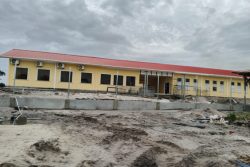As one examines the ever evolving culture of Guyanese society, the shortchanging of a well-rounded high school experience for students of the last two decades, unfortunately, glows brightly in the spotlight. The main contributor to this deprivation has been the blossoming of the extra lessons phenomenon from a burgeoning cottage industry into an accepted standard element of high school life.
The culture of extra lessons has always existed since post-independence days. In the early days, students sought additional tutoring – as it was aptly termed – in one or two subjects, at the most, in which they were experiencing difficulty in grasping concepts (more often than not in mathematics), or in which they held an interest, such as a foreign language that was not offered on the curriculum of the school which they were attending. Quite often, in the former instance, these sessions were offered, free of cost to the student(s), by the very teachers who taught their classes, and simply required the students to remain at the end of the day for an hour or so, for more personalised attention.
Over time, the eroding standards in education across the board have led to many parents losing complete faith in the quality of education, and their insistence of the enrolment of their children in several extra lessons classes. It is not unusual today for students to be attending one extra class early in the morning before school starts, and then two or three more classes at varying locations, after school, and then again on Saturday mornings and afternoons, and in extreme circumstances, even on Sundays. (In this instance, we will bypass the callous practice of those teachers who withhold teaching the complete syllabus to their assigned classes, thus forcing students to attend their private extra lessons classes.) The culture of extra lessons has evolved to the point now where students who opt not to attend, or whose parents cannot afford the exploitative fees, are frowned upon, and can even be subjected to peer pressure taunting.
The catastrophic spinoff of this effective closure of the afternoon post-school window by the virtual compulsory attendance at extra lessons has been the deprivation of the opportunities for high school students to participate in extracurricular activities, which would take place during this time slot. These wide-ranging activities still occur, but on a much reduced scale when compared to previous decades and include sports: football, cricket, basketball, hockey, table tennis, volleyball, badminton, chess, athletics; the arts (via school societies) – school steel band, music club, literary and debating club, historical society, and other miscellaneous endeavours such as the tour club, photographic society, school newsletter and magazine society, cadets, scouting and girl guides.
These extracurricular activities, which back in the day were often supervised by an assigned teacher (whose modern-day counterpart would probably have to politely decline today, in order to fulfil his/her extra lessons obligations) who provided minimal guidance as the students sought to organise themselves. The sporting activities varied from intra-form challenges to inter-year contests, or in the case of the larger schools, were organised along the lines of Inter-House competitions. It was not uncommon for the third form students to take the initiative to approach their peers from other schools to friendly challenges at football or basketball. Those students selected for sports competitions run by the Ministry of Education or the Ministry of Culture, Youth and Sport experienced relatively early in life the honour and privilege of representing an institution. Apart from the obvious benefits of exercise and physical development spawned by the sporting activities, the players developed good sportsmanship by learning to respect the rulings of the officials, whether they agreed with the calls or not, and accept the inevitable winning or losing that comes with any sport. The non-sport societies are just as equally important in terms of character development, as students overlooked by their teachers, learnt the rudiments of club structure, organisation, activity planning and execution.
The argument that the students can’t miss what they never had holds no water. It is sacrilegious to deny high school students these horizon expanding opportunities by burdening them with a slew of extra lessons classes. Apart from forging independence of thought, these activities facilitate the early development of leadership, public speaking, and inter-personal skills from mingling with students of all ages and backgrounds.
The glory years of high school meshed with the teenage and puberty years should not be confined to a perpetual cycle of classrooms, blackboards, lessons, teachers, extra lessons, homework, assignments, tests and end of term examinations. Very few students have, or will escape running this miserable gauntlet of extra lessons unscathed. Those critics anxious to dismiss this view as that of ‘some ole geezer’ staring too long into life’s rear view mirror, should remember that the building blocks of good character, namely integrity, honesty, good manners and sound etiquette, have not changed in centuries.
We are doing a great disservice to our high school generations by depriving them of the chance to develop these life forming qualities by engaging with their peers and rivals from other schools through these extracurricular activities. To expand on that old maxim, ‘all work and no play makes Jack and Jill dull boys and girls’. Evidence of a lack of even the most basic social skills is ever present in all sectors of society. We must find a way to ensure that all of our students have the options to experience every aspect of high school life. It is the very least we can do.








